| Listing 1 - 8 of 8 |
Sort by
|
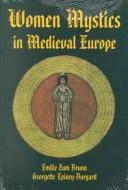
ISBN: 0913729167 Year: 1989 Publisher: New York Paragon House
Abstract | Keywords | Export | Availability | Bookmark
 Loading...
Loading...Choose an application
- Reference Manager
- EndNote
- RefWorks (Direct export to RefWorks)
Christian spirituality --- anno 500-1499 --- Women mystics --- Europe --- Mysticism --- History --- Middle Ages, 600-1500 --- Women mystics - Europe. --- Mysticism - Europe - History. --- Mysticism - History - Middle Ages, 600-1500. --- Middle Ages, 500-1500
Book
ISBN: 9788884506528 9788884508478 8884506522 8884508479 Year: 2015 Volume: 24 Publisher: Firenze: Ed. del Galluzzo,
Abstract | Keywords | Export | Availability | Bookmark
 Loading...
Loading...Choose an application
- Reference Manager
- EndNote
- RefWorks (Direct export to RefWorks)
Il XII secolo è conosciuto nella storiografia come secolo di un grande cambiamento. La nascita delle Università, un rinnovato interesse per la tradizione antica e l’affermarsi della poesia nelle lingue volgari sono i segnali meglio conosciuti di questa trasformazione. Ma anche un’altra grande novità caratterizza questo tempo in una diversa direzione: l’invenzione della scrittura mistica femminile. Le poliedriche visioni di Ildegarde di Bingen aprono un capitolo decisivo nella storia della cultura europea, che ancora in tutto il secolo XIII offrirà personalità poetiche e spirituali di prim’ordine, come Hadewijch di Anversa, Matilde di Hackeborn e Geltrude di Helfta. Donne ai margini della cultura e del potere narrano un’assoluta familiarità con Dio, diretta e senza mediazione, una familiarità che le conduce in innumerevoli viaggi nello spazio e nel tempo, dando luogo a motivi letterari inattesi, rappresentativi di una più alta consapevolezza cristiana. Il libro raccoglie i testi di queste scrittrici, alcune pressoché sconosciute e in molti casi mai tradotte in lingua italiana, documentandone le nuove istanze spirituali e intellettuali.
Mysticism and literature --- Mystics --- Mysticisme et littérature --- Mystiques --- Women mystics --- Mysticism --- Christian literature --- History --- Catholic Church --- Mysticisme et littérature --- Women mystics - Europe - Biography --- Mysticism - History - Middle Ages, 600-1500 --- Mysticism - Catholic Church --- Mystique féminine
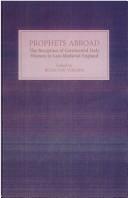
ISBN: 0859914259 9780859914253 Year: 1996 Publisher: Cambridge: Brewer,
Abstract | Keywords | Export | Availability | Bookmark
 Loading...
Loading...Choose an application
- Reference Manager
- EndNote
- RefWorks (Direct export to RefWorks)
Christian church history --- anno 1200-1499 --- England --- Women mystics --- Christian women saints --- Women in Christianity --- Mysticism --- Spiritual life --- History --- Christianity --- Church history --- Women mystics - Europe --- Christian women saints - Europe --- Mysticism - History - Middle Ages, 600-1500 --- Mysticism - England - History --- Spiritual life - Christianity --- England - Church history - 1066-1485 --- CHRISTIAN WOMEN --- SPIRITUALITY --- EUROPE --- MIDDLE AGES, 600-1500
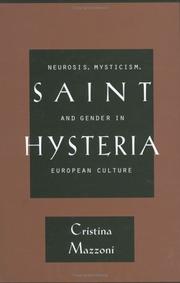
ISBN: 0801432294 Year: 1996 Publisher: Ithaca (N.Y.) : Cornell university press,
Abstract | Keywords | Export | Availability | Bookmark
 Loading...
Loading...Choose an application
- Reference Manager
- EndNote
- RefWorks (Direct export to RefWorks)
Ecstasy --- Elan religieux --- Enthousiasme religieux --- Extase --- Godsdienstige verrukking --- Godsdienstige vervoering --- Hysteria --- Hysterical neuroses --- Hysterie --- Hystérie --- Psychiatrie en godsdienst --- Psychiatrie et religion --- Psychiatry and religion --- Religieuze geestdrift --- Religieuze vervoering --- Religion and psychiatry --- Christian women saints --- Ecstasy. --- Hysteria. --- Psychiatry and religion. --- Women mystics --- Psychology. --- Europe --- Psychology --- Women mystics - Europe - Psychology. --- Christian women saints - Europe - Psychology.
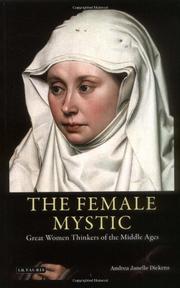
ISBN: 9781845116408 9781845116415 1845116402 1845116410 Year: 2009 Volume: 60 Publisher: London: Tauris Academis Studies,
Abstract | Keywords | Export | Availability | Bookmark
 Loading...
Loading...Choose an application
- Reference Manager
- EndNote
- RefWorks (Direct export to RefWorks)
The Middle Ages saw a flourishing of mysticism that was astonishing for its richness and distinctiveness. The medieval period was unlike any other period of Christianity in producing people who frequently claimed visions of Christ and Mary, uttered prophecies, gave voice to ecstatic experiences, recited poems and songs said to emanate directly from God and changed their ways of life as a result of these special revelations. Many recipients of these alleged divine gifts were women. Yet the female contribution to western Europe's intellectual and religious development is still not well understood. Popular or lay religion has been overshadowed by academic theology, which was predominantly the theology of men. This timely book rectifies the neglect by examining a number of women whose lives exemplify traditions which were central to medieval theology but whose contributions have tended to be dismissed as "merely spiritual" by today's scholars. In their different ways, visionaries like Richeldis de Faverches (founder of the Holy House at Walsingham, or "England's Nazareth"), the learned Hildegard of Bingen, Hadewijch of Brabant (exemplary voice of the Beguine tradition of love mysticism), charismatic traveller and pilgrim Margery Kempe and anchoress Julian of Norwich all challenged traditional male scholastic theology. Designed for the use of undergraduate student and general reader alike, this attractive survey provides an introduction to thirteen remarkable women and sets their ideas in context.
Mystics --- anno 1100-1199 --- anno 1200-1499 --- anno 1000-1099 --- Women mystics --- Mysticism --- Intellectual life --- History --- 248 "04/14" --- 248-055.2 --- Spiritualite. Ascese. Mystique. Theologie ascetique et mystique. Devotion--Middeleeuwen --- Vrouwen en spiritualiteit --- 248-055.2 Vrouwen en spiritualiteit --- Frau. --- Mystik. --- Mystikerin. --- Frauenmystik. --- Mystiker --- Kvinnliga mystiker --- Intellectual life. --- filosofer --- författare --- historia --- Angela, --- Christina, --- Hadewijch, --- Hildegardis, --- Iuliana, --- Marguerite, --- Mechthild, --- Teresa, --- Geschichte 1000-1600. --- Historia --- Filosofer --- Författare --- Matilda of Magdeburg --- Hadewijch --- Angela of Foligno --- Teresa of Avila --- Catherine of Siena --- Hildegard of Bingen --- Margaret Porette --- Christina the Astonishing --- Julian of Norwich --- anno 500-1499 --- Richeldis of Faverches --- Kempe, Margery --- Women mystics - Europe - Intellectual life --- Mysticism - Europe - History - Middle Ages, 600-1500 --- Women mystics - Europe - History - To 1500 --- Mystique féminine --- Walsingham --- Hildegardis abb. Bingensis --- Christina Mirabilis v. --- Mechtildis Magdeburgensis --- Mechtildis de Hackeborn --- Angela de Fulginio --- Porète, Marguerite --- Iuliana Norvicensis --- Catharina v. Senensis --- Teresia a Iesu --- Spirituality --- Book
Book
ISBN: 3796605931 9783796605932 Year: 1985 Publisher: Ostfildern bei Stuttgart: Schwabenverlag,
Abstract | Keywords | Export | Availability | Bookmark
 Loading...
Loading...Choose an application
- Reference Manager
- EndNote
- RefWorks (Direct export to RefWorks)
Christian spirituality --- anno 500-1499 --- Femmes mystiques --- Mystica's --- Mysticism in literature --- Mystiek in de literatuur --- Mystique dans la littérature --- Women mystics --- Mysticism --- Congresses --- History --- -Mysticism --- -#GROL:SEMI-248.2<09> --- #gsdb10 --- Dark night of the soul --- Mystical theology --- Theology, Mystical --- Spiritual life --- Negative theology --- Mystics --- -Congresses --- Congresses. --- #GROL:SEMI-248.2<09> --- History&delete& --- Women mystics - Europe - Congresses --- Mysticism - History - Middle Ages, 600-1500 - Congresses
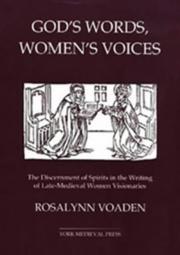
ISBN: 0952973421 9780952973423 Year: 1999 Publisher: Rochester: Boydell and Brewer,
Abstract | Keywords | Export | Availability | Bookmark
 Loading...
Loading...Choose an application
- Reference Manager
- EndNote
- RefWorks (Direct export to RefWorks)
Christian spirituality --- Alphonse of Pecha --- Kempe, Margery --- Bridget of Sweden --- Women mystics --- Private revelations --- Discernment of spirits --- History. --- History of doctrines --- Kempe, Margery, --- Bridget, --- Pecha, Alfonso, --- Women mystics - Europe - History. --- Private revelations - History of doctrines - Middle Ages, 600-1500. --- Discernment of spirits - History of doctrines - Middle Ages, 600-1500. --- WOMEN MYSTICS --- PRIVATE REVELATIONS --- SPIRITUAL LIFE --- BRIDGET OF SWEDEN (SAINT), ca.1303-1373 --- PECHA (ALFONSO), 1329 or 30-1389 --- KEMPE (MARGERY), 1373-CA 1436 --- HISTORY OF DOCTRINES --- MIDDLE AGES, 600-1500
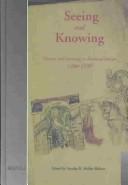
ISBN: 2503514480 9782503514482 9782503526423 Year: 2004 Volume: 11 Publisher: Tunhout: Brepols,
Abstract | Keywords | Export | Availability | Bookmark
 Loading...
Loading...Choose an application
- Reference Manager
- EndNote
- RefWorks (Direct export to RefWorks)
The transmission of knowledge in clerical and academic settings of the later Middle Ages has been relatively well studied by traditional scholarship. But successes achieved in other subject-areas by the application of a set of methodologies grouped under the rubric of ‘gender studies’ may offer insights into medieval education. This approach invites a re-examination in gender-political terms of the definition of knowledge by clerical elites and the concomitant rejection from the category of ‘knowledge’ of many varieties of knowledge which did not coincide with their template. The ten articles of this volume focus both on the perennial valorization of the content and methods of clerical/academic education, on the limitation of venues for its transmission to sites from which women were categorically excluded, and, in terms of media for the transmission of knowledge, on the attendant restriction of the techniques and media considered valid for the storage, retrieval, and communication of knowledge to those that were current in these privileged sites.The volume addresses the following issues: what varieties of knowledge were available to communities of women? What kinds of knowledge originated in or became characteristic of women’s communities? What techniques did women develop to preserve and transmit their knowledge? In what ways and with what success was women’s knowledge valorized, both by authors from within these communities and by ‘authoritative’ figures from outside? Under what circumstances could women become authoritative originators of and transmitters of knowledge?
248.2 --- 248-055.2 --- 028-055.2 --- 248.2 Mystieke theologie. Mystiek. Mysticisme --- Mystieke theologie. Mystiek. Mysticisme --- 028-055.2 Vrouwelijke lezers --- Vrouwelijke lezers --- 248-055.2 Vrouwen en spiritualiteit --- Vrouwen en spiritualiteit --- History of Europe --- anno 1200-1499 --- anno 1500-1599 --- Knowledge, Sociology of --- Mysticism --- Scholars, Medieval --- Scholars, Medieval. --- Women intellectuals --- Women mystics --- Women scholars --- History --- History. --- Femmes --- Geschiedenis van de Middeleeuwen --- Geschiedenis van het onderwijs --- Histoire de l'enseignement --- Histoire du Moyen Age --- Vrouwen --- Women --- Intellectuelles --- Savantes --- Mysticisme --- Sociologie de la connaissance --- Education --- Histoire --- anno 500-1499 --- Scholars --- Women in education --- Women specialists --- Mystics --- Intellectuals --- Medieval scholars --- Europe --- To 1500 --- Middle Ages, 600-1500 --- Knowledge [Sociology of ] --- Middle Ages, 500-1500 --- Women intellectuals - Europe - History - To 1500 --- Women scholars - Europe - History - To 1500 --- Women mystics - Europe - History - To 1500 --- Mysticism - History - Middle Ages, 600-1500 --- Knowledge, Sociology of - History - To 1500 --- Scholars, Medieval - History - To 1500 --- Gender --- Religion --- Religious communities --- Writers --- Spirituality --- Book --- Epistemology
| Listing 1 - 8 of 8 |
Sort by
|

 Search
Search Feedback
Feedback About UniCat
About UniCat  Help
Help News
News